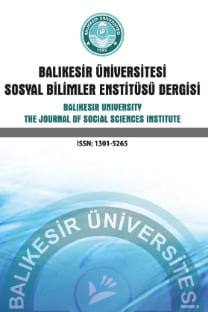Çalışanların örgütsel adalet algılarında yöneticilerinin etik liderlik davranışlarının rolü
The role of managers ethical leadership behaviours on organizational justice perception of workers
___
- · Anderson, J.C. ve Gerbing, D.W. (1988). Structural Equation Modeling in Practice: A Review and Recommended Two-Step Approach. Psychological Bulletin, 103(3), 411-423.
- · Bies, R. (2001). Interactional (In)Justice: The Sacred and the Profane. Edited by: Greenberg, J. ve Cropanzano, R. Advances in Organizational Justice, Stanford University Pres., 89-118.
- · Brown, M.E., Trevino, L.K. ve Harrison, D.A. (2005). Ethical Leadership: A Social Learning Perspective for Construct Development and Testing. Organizational Behavior and Human Decision Processes, 97, 117-134.
- · Brown, M.E. ve Trevino, L.K. (2006). Ethical Leadership: A Review and Future Directions. The Leadership Quarterly, 17(6), 595-616.
- · Cohen, R.L. (1987). Distributive Justice: Theory and Research. Social Justice Research, 1(1), 19-40.
- · De Hoogh, A.H.B. ve Den Hartog, D.N. (2008). Ethical and Despotic Leadership, Relationships with Leaders Social Responsibility, Top Management Team Effectiveness and Subordinates Optimism: A Multi-Method Study. The Leadership Quarterly, 19(3), 297-311.
- · Foley, S., Kidder, D.L. ve Powell, G.N. (2002). The Perceived Glass Ceiling and Justice Perceptions: An Investigation of Hispanic Law Associates. Journal of Management, 28(4), 471-496.
- · Folger, R. (1987). Distributive and Procedural Justice in the Workplace. Social Justice Research, 1(2), 143-159.
- · Folger, R. ve Cropanzano, R. (1998). Organizational Justice and Human Resource Management. London: Sage Publications Inc.
- · Freeman, R.E. ve Stewart, L. (2006). Developing Ethical Leadership. Balikesir University The Journal of Social Sciences Institute Volume: 16 - Number: 30, December 2013 163USA: Business Roundtable Institute for Corporate Ethics.
- · Greenberg, J. (2000), Promote Procedural Justice to Enhance Acceptance of Work Outcomes. Edited by: Locke, E.A., Handbook of Principles of Organizational Behavior, Blackwell Publishing, 181- 195.
- · Judeh, M. (2011). Ethical Decision Making and Its Relationship with Organizational Justice. International Journal of Academic Research, 3(4) , 215-220.
- · Mendonca, M. (2001). Preparing for Ethical Leadership in Organizations. Canadian Journal of Administrative Sciences, 18(4), 266-276.
- · Neubert, M.J., Carlson, D.S., Kacmar, K.M., Roberts, J.A. ve Chonko, L.B. (2009). The Virtuous Infuence of Ethical Leadership Behavior: Evidence from the Field. Journal of Business Ethics, 90(2), 157-170.
- · Niehoff, B.N. ve Moorman R. (1993). Justice as a Mediator of Relationship between Methods of Monitoring and Organizational Citizenship Behavior. Academy of Management Journal, 36, 527-556.
- · Schminke, M., Ambrose, M.L. ve Neubaum, D.O. (2005). The Effect of Leader Moral Development on Ethical Climate and Employee Attitudes. Organizational Behavior and Human Decision Processes, 97(2), 135-151.
- · Thomas, T., Schermerhorn, J.R. ve Dienhart, J.W. (2004). Strategic Leadership of Ethical Behavior in Business. Academy of Management Executive, 18(2), 56-66.
- · Trevino, L.K. ve Brown, M.E. (2004). Managing to be Ethical: Debunking Five Business Ethics Myths. Academy of Management Executive, 18(2), 69-81.
- · Uğurlu, C.T. ve Üstüner, M. (2011). Öğretmenlerin Örgütsel Bağlılık Düzeylerine Yöneticilerinin Etik Liderlik ve Örgütsel Adale Davranışlarının Etkisi. Hacettepe Üniversitesi Eğitim Fakültes Dergisi, 26(41), 434-448.
- · Wouters, K. ve Maesschalck, J. (2011). Leadership Perceptions and Integrity-An Empirical Study. 2011 EGPA Annual Conference. _____http:/ egpa-conference2011.org/documents/ PSG7/Wouters-Maesschalck pdf.> (04.03.2012).
- · Yavuz, E. (2010). Kamu ve Özel Sektör Çalışanlarının Örgütse Adalet Algılamaları Üzerine Bir Karşılaştırma Çalışması. Doğu Üniversitesi Dergisi, 11(2), 302-312.
- · Zhu, W, May, D.R. ve Avolio, B.J. (2004). The Impact of Ethica Leadership Behavior on Employee Outcomes: The Roles o Psychological Empowerment and Authenticity. Journal of Leadership and Organizational Studies, 11(1), 16-26.
- · Zhu, W. (2008). The Effect of Leadership on Follower Moral Identity The Mediating Role of Psychological Empowerment. Leadership Review, 8(2), 62-73.
- · Zhu, W., Avolio, B.J., Riggio, R.E. ve Sosik, J.J. (2011). The Effec of Authentic Transformational Leadership on Follower and Group Ethics. The Leadership Quarterly, 22(5), 801-817.
- ISSN: 1301-5265
- Yayın Aralığı: 2
- Başlangıç: 1998
- Yayıncı: Balıkesir Üniversitesi Sosyal Bilimler Enstitüsü
Çalışanların örgütsel adalet algılarında yöneticilerinin etik liderlik davranışlarının rolü
Erdem AKTAŞ, Osman Avşar KUGUN, Ediz GÜRIPEK
Türkiye'de Gastronomi turizmi üzerine genel bir değerlendirme
Ülker Erdoğan ARACI, Turgay BUCAK
İbrahim Hakan KARATAŞ, Zehra ŞAŞMAZ
MÜTAREKE MECLİSİNDE ERMENİ MESELESİ TARTIŞMALARI
Mütareke Meclisinde Ermeni meselesi tartışmaları
IMPACT OF THE SERVICE QUALITY OF TURKISH THERMAL HOTEL ENTERPRISES ON CUSTOMER LOYALTY
Oktay EMIR, Didem PAŞAOĞLU BAŞ
ÇALIŞANLARIN ÖRGÜTSEL ADALET ALGILARINDA YÖNETİCİLERİNİN ETİK LİDERLİK DAVRANIŞLARININ ROLÜ
